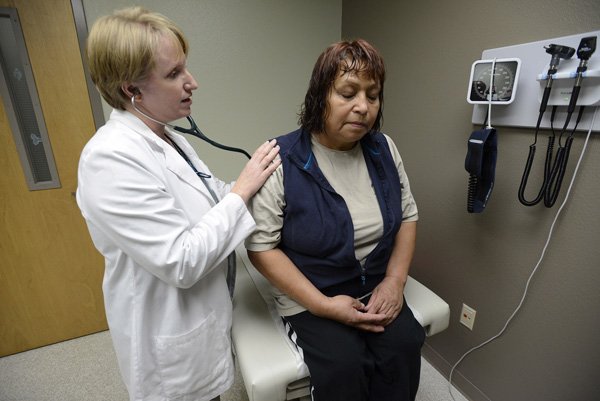ROGERS — Uninsured state residents cost hospitals millions of dollars in uncompensated services and raise health insurance rates to help compensate for lost revenue, state officials said.
Some of the richest counties in the state have the highest uninsured rates.
Between 52.1 percent and 63.9 percent of adults between the ages of 19 and 64 in Benton County are uninsured, according to the 2010 Census. Washington County has 47.9 percent to 52 percent uninsured adults in the same age range, according to the census.
At A Glance
Health Care Changes
The extension of Medicaid and the implementation of the health care exchange in Arkansas would:
• Qualify 16,755 adults between the ages of 18 to 64 for Medicaid in Washington County and 16,565 for exchange subsidies to purchase insurance.
• Qualify 13,266 adults between the ages of 18 to 64 for Medicaid in Benton County and 15,969 for exchange subsidies to purchase insurance.
• Save the state $372 billion between 2014 and 2021.
Sources: Staff Report
Bo Ryall, president of the Arkansas Hospital Association, said uninsured residents cost state hospitals $338 million a year in uncompensated health care.
A proposal to expand the state Medicaid program will be one issue the state Legislature is expected to debate next year.
If the Legislature approves the Medicaid expansion, an additional 32,000 people in Washington and Benton counties would be eligible for Medicaid, said Laura Kellams, Northwest Arkansas director of Arkansas Advocates for Children & Families.
“We support the extension of the Medicaid program,” Kellams said. “The way the law is written, it is difficult for adults to qualify for Medicaid. If the Medicaid program is extended, it will help about 200,000 adults across the state qualify.”
The Affordable Health Care Act also will get more people insured, Kellams said.
“For those families that don’t qualify for Medicaid, the Affordable Health Care Act will allow individuals and families to purchase health insurance from an insurance exchange further reducing the number of uninsured adults in the state,” Kellams said.
The Arkansas Hospital Association also supports extension of Medicaid coverage, Ryall said.
“We are lobbying the Legislature to approve the Medicaid extension proposed by President Obama. We have health care providers, hospital administrators and nurses talking to their representatives,” Ryall said.
The expansion of Medicaid coupled with the Affordable Health Care Act won’t solve all the funding problems, Ryall said. “But it will sure help,” he said.
Other organizations provide health care to the uninsured. Among them is Community Clinic, a ministry of St. Francis House NWA which has three area clinics providing primary care for people without insurance.
“We have clinics in Springdale, Rogers and Siloam Springs,” said Kathy Grisham, executive director of Community Clinic. “We provide primary care for children and adults. It’s not free. The patients pay on a sliding scale of what they can afford based on annual income and the number of family members, but nobody is turned away.”
Many of the children who use the clinic have Medicaid through ARKids First, Grisham said.
“Providing primary care for children and adults accomplishes several things. First and foremost, we have healthier adults and children. Secondly, it takes the pressure off of emergency rooms where many people without insurance go. By the time an uninsured person goes to the emergency room, they are usually very sick and may need extensive treatment or even hospitalization,” Grisham said.
Primary care can often deal with health issue in the early stages, which saves time and money, she said.
The clinic also can help patients get low-cost prescriptions and, in some cases, free prescriptions, said Dr. Ornette Gaines, one of the primary care physicians at the Rogers clinic.
“Walmart offers several $4 prescriptions and pharmaceutical companies give the clinic some samples we can hand out,” Gaines said.
The care patients receive is equal to any private clinic, Gaines said.
Kate Overton, who has used the clinic for several years as her primary caregiver, said the care she gets is excellent.
“We had our daughter on Medicaid because we couldn’t afford insurance, that’s how we got involved with the Community Clinic,” Overton said. “When my husband lost his job, we also lost our health insurance so we all started going to the clinic. We get great care, and we can afford it where we can’t afford insurance.”
Brig Caldwell, who works full time, said he uses the clinic because he can’t afford insurance for his family.
“The people I work for offer insurance, but I can’t afford it because it would be more than $600 a month for me to insure my family. I think the clinic is a great asset in our community,” Caldwell said.
Advocates for Children & Families officials support extension of Medicaid for a variety of reasons beyond health care.
“For every dollar the state spends of Medicaid it creates $6 in the local community and creates thousands of good paying, full-time jobs for people in the health industry. There really isn’t a downside to Medicaid extension in my book,” Kellams said.

